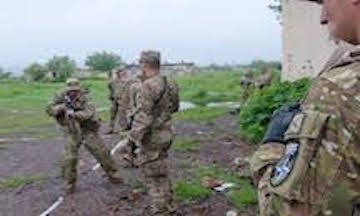The Implications of NATO’S Noble Partner-2017 Exercises for the South Caucasus
By Eduard Abrahamyan
July 11, 2017, the CACI Analyst
In early March, Georgia’s Defense Ministry announced the details of the NATO-backed Noble Partner-2017 multinational drills, scheduled for July 30. Armenia and Azerbaijan are set to participate in the exercises, along with 11 other NATO partners and allies. Noble Partner will be the first large-scale practical NATO initiative gathering Georgian, Armenian and Azerbaijani troops to perform a common task. Moreover, Montenegro's NATO accession seems to have renewed the impetus for the South Caucasian states to reengage with the Alliance. However, the question is whether Yerevan and Baku are capable of defying Russia’s potential reaction to their renewed endeavor to cooperate with NATO in terms of joint exercises.

EU–China trade to bolster security in the South Caucasus
By Boris Ajeganov
January 23, 2017, the CACI Analyst
Foreign investment in Georgia is strengthening the country’s importance in connecting East Asia with Europe, which has positive implications for the broader region. The rise in FDI in commercial and transportation infrastructure in combination with the signing of international free trade agreements will reduce Georgia’s vulnerability in terms of economic and, ultimately, ‘hard’ security. The growing importance of the South Caucasus as node for EU-China trade will weaken Russia’s incentives to undermine its southern neighbors by military, political, and economic means as it has done in the past. Accordingly, Tbilisi’s ability to conduct an independent foreign policy is set to improve despite the absence of Western security guarantees.
Advancing Georgian-U.S. security cooperation after the Trump transition
By Richard Weitz
January 19th 2017, the CACI Analyst
The Trump administration will soon undertake a comprehensive review of Russia-US relations and U.S. policy toward the rest of Eurasia. Although the new team will presumably consider many options, the president-elect’s statements imply that the U.S. will not soon support further NATO expansion or other actions that would strongly antagonize Moscow. Despite this limitation, the U.S. government will continue security ties with U.S. partners in Eurasia, such as Georgia. In practice, there are a number of steps the U.S. and Georgia can undertake to advance their mutual security.
New signs of Chinese military interest in Central Asia
By Stephen Blank
January 16th, 2017, The CACI Analyst
Recent evidence shows a gradual increase in Chinese military activity in Central Asia, particularly with Tajikistan, Afghanistan, and Pakistan, although China has for years denied any military interest in the region. In October, PLA and Tajik forces jointly participated in counterterrorism exercises in Tajikistan near the border with Afghanistan, following earlier activity in 2016. Whereas Tajikistan was then silent, this time it publicized the exercises, which aroused a visible anxiety in the Russian media although the Russian government has hitherto been unwilling to comment on this issue. China’s initiative could imply a major new development in Chinese policy and in Central Asia’s overall security, with lasting implications for the region.
Russia and Armenia establish joint ground forces
By Eduard Abrahamyan
December 16th, 2016, The CACI Analyst
On November 12, 2016, Vladimir Putin officially approved a government proposal to form a permanent joint Russian-Armenian ground force. This is the second Russian initiative following the establishment of a united Russian-Armenian regional air defense system. As the crisis in Ukraine has expanded, the security thinking of the Russian leadership has undergone important changes regarding the imposition of actionable mechanisms intended to prevent allies such as Armenia from drifting westwards. By reinforcing existing military bases and simultaneously integrating Armenia’s armed forces into its Southern Military District (SMD) framework, Russia seeks to bolster its control over Armenia’s defense strategy and defense policy-making.






